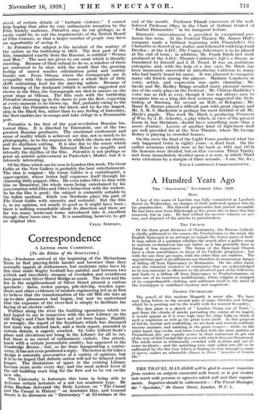Correspondence
A LETTER FROM CAMBRIDGE. [To the Editor of the SPECTATOR.] SIR,—Fresiunen arrived at the beginning of the Michaelmas Term to find playing-fields harder and browner than they normally appear at midsummer, but moderate rains have by this time made Rugby football less painful, and between two p'clock and two-thirty streams of overladen and overdriven bars pour over Silver Street Bridge as usual. The river and the fen in the neighbourhood of Silver Street present a curious spectacle : dams, motor pumps, pile-driving, wooden ague-
ucts and other evidences of modern engineering led us at first to believe that the transformation of the old Mill site into an u_p-to-date pleasaunce had begun, but now we understand that the exposure of the river-bed is simply to facilitate the laying of an electric cable.
Further along the river the building operations which we had hoped to see-in connexion with the new Library on the Old King's and Clare field have not yet been begun. Rightly Or wrongly, the report of the Syndicate which was discussed last term was referred back, and a fresh report, amended in certain details, is eagerly awaited. Sir Giles Gilbert Scott's plans and elevations are hung in the Library for all to see, but there is no crowd of enthusiastic visitors. One attack, bade with a certain journalistic crudity, has appeared in the Cage e Review ; but, so far from inaugurating a contro- versy, it has not even produced a reply. The tower in Sir Giles's design is naturally provocative of a variety of opinions, but it is to be hoped that definite action will not be delayed much longer.' The limitations of space in the existing Library ecome more acute every day, and the most ardent lover of the old building must long for the first sod to be cut on the new site.
The University is fortunate this term in being able to Welcome certain lecturers of a not too academic type. Mr John Buchan delivered the Rede. Lecture on " The Causal and the Casual in History " on Armistice Day, and General Smuts is to discourse on Democracy " at Newnham at the end of the month. Professor Piccoli (successor of the well- beloved Professor Okey in the Chair of Italian) treated of " Italian Humanities " in his inaugural lecture.
Dramatic entertainment is provided in exceptional pro- fusion this term. At the Festival Theatre Mr. Anmer Hall's
company made a brilliant beginning with Pirandello's Six Characters in Search of an Author, and followed it with Gogol and Dryden ; at the A.D.C. The Voysey Inheritance is to be played at the end of term ; in addition, Mr. Frank Birch last week produced at the A.D.C. Theatre Calderon's Life's a Dream, as translated by himself and J. B. Trend. It was an ambitious enterprise, and, with the help of a fine cast, Mr. Birch has been immensely successful in introducing Calderon to ninny who had barely heard his name. It was pleasant to recognize many old friends among the players. Madame Lopokova in
voice, action, and expression was quite charming ; Mr. Savile and Mr. Hedley Briggs recalled many pleasant memo-
ries of the early plays at the Festival ; Mr. Clinton-Baddeley's voice was as rich as ever, though it was not always easy to recognize him as a king (his first costume suggested the Arch- bishop of Strelsau, his second an M.D. of Bologna) ; Mr. Barry K. Barnes played a difficult part with great vigour, and Mr. A. M. S. Mackenzie is perhaps the most faithful of all Mr. Birch's pupils. This week Mr. Birch is producing Prisoners of War, by J. R. Ackerley, a play which, in view of the present boom in war literature, should have something more than a *Web d'estime. Lovers of another kind of high-brow stuff are well provided for at the New Theatre, where Mr. George Robey is playing to crowded houses.
On the river the final of the Light Fours produced what has only happened twice in eighty years—a dead heat. On the earlier occasions (which were as far back as 1861 and 1874) the honours were divided, but on this occasion Third Trinity and Jesus immediately decided upon a re-row, in which Third were victorious by a margin of three seconds.—I am, Sir, &c.,
YOUlt CAMBRIDGE CORRESPONDENT.








































 Previous page
Previous page